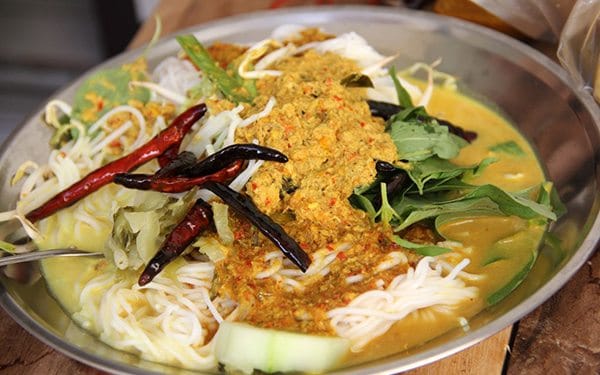Not knowing what you’re getting is a common concern for people trying out Thailand’s street food for the first time.
Too much sugar, MSG and high spice levels are the usual culprits identified.
But there may be another problem that you haven’t yet considered: high amounts of artificial preservatives loaded into your street-side meal.
A recent survey carried out on the chemical make-up of kanom jeen noodles bought in Bangkok’s fresh markets, found that while every sample contained benzoic acid, 17 percent of them contained what is considered ‘excessive’ levels.
Although benzoic acid is also found in make-up, dyes, insect repellants and plastics, its most common use is as a food preservative as it inhibits the growth of yeast, a major cause of food spoilage, according to Live Strong.
It’s a toxic substance, hence why its addition into foods is meant to be strictly controlled – most foods are allowed no more than 1,000 mg per kilo. Ingestion of excessive benzoic acid can cause shortness of breath and possible collapse, while long-term consumers may face liver and kidney problems, or even colon cancer.
While benzoic acid is normally destroyed during the cooking process, the fact that kanom jeen is generally eaten without being heated exposes the eaters to a higher risk of consuming excess amounts.
According to the survey carried out by the Foundation for Consumers, two of the samples they tested (out of products from 12 producers) were over this limit – one bought from Ying Charoen market had 1,121.7 mg per kilo while another from Saphan Khao market contained 1,115.2 mg per kilo, according to the Bangkok Post.
The Foundation of Consumers will be submitting their findings to the FDA in a bid to expedite the process of getting all producers to clearly label their products, to raise the level of awareness among consumers about what exactly they’re putting in their bodies.
Kanom jeen sold in packets is already meant to display its ingredients although enforcement of this law has not been particularly strict – producers who are found not be correctly labelling face fines of up to ฿30,000 while ฿50,000 is the penalty for those found to be selling products that exceed the agreed safe limits.
Featured image is via Learn Thai With Mod


